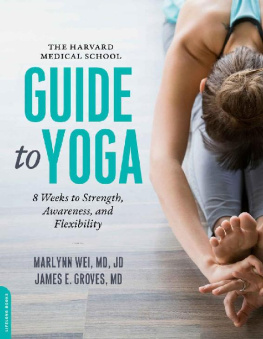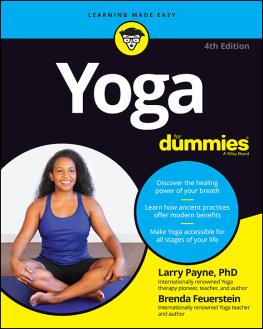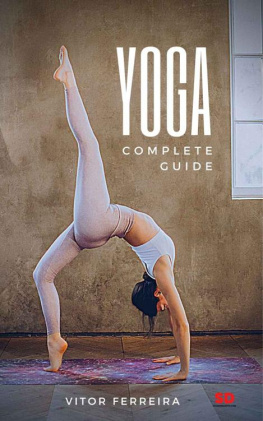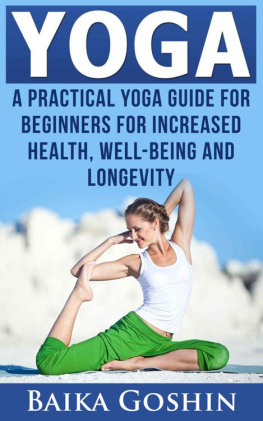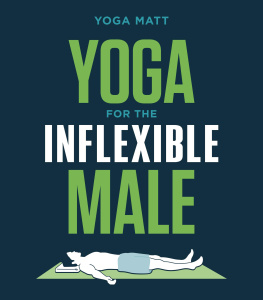
Many of the designations used by manufacturers and sellers to distinguish their products are claimed as trademarks. Where those designations appear in this book and Da Capo Press was aware of a trademark claim, the designations have been printed in initial capital letters.
Copyright 2017 by Harvard University
Illustrations, Figures, and Tables: Marlynn Wei, MD, JD
All rights reserved. No part of this publication may be reproduced, stored in a retrieval system, or transmitted, in any form or by any means, electronic, mechanical, photocopying, recording, or otherwise, without the prior written permission of the publisher. For information, address Da Capo Press, 53 State Street, 9th floor, Boston, MA 02109.
Designed by Jeff Williams
Set in 11.25 point Fairfield by the Perseus Books Group
Library of Congress Cataloging-in-Publication Data
Names: Groves, James E., author. | Wei, Marlynn, author.
Title: The Harvard Medical School guide to yoga : eight weeks to strength, awareness, and flexibility / by Marlynn Wei, MD, JD and James Groves MD.
Description: First Da Capo Press edition. | Boston, MA : Da Capo Lifelong Books, a member of the Perseus Books Group, 2017.
Identifiers: LCCN 2016057402 | ISBN 9780738219363 (paperback) | ISBN 9780738219370 (ebook)
Subjects: LCSH: Hatha yogaPopular works. | Self-care, HealthPopular works. | BISAC: HEALTH & FITNESS / Yoga. | BODY, MIND & SPIRIT / Meditation.
Classification: LCC RA781.7 .G77 2017 | DDC 613.7/046dc23 LC record available at https://lccn.loc.gov/2016057402
Published by Da Capo Press, an imprint of Perseus Books, LLC, a subsidiary of Hachette Book Group, Inc.
www.dacapopress.com
Note: The information in this book is true and complete to the best of our knowledge. This book is intended only as an informative guide for those wishing to know more about health issues. In no way is this book intended to replace, countermand, or conflict with the advice given to you by your own physician. The ultimate decision concerning care should be made between you and your doctor. We strongly recommend you follow his or her advice. Information in this book is general and is offered with no guarantees on the part of the authors or Da Capo Press. The authors and publisher disclaim all liability in connection with the use of this book.
Da Capo Press books are available at special discounts for bulk purchases in the U.S. by corporations, institutions, and other organizations. For more information, please contact the Special Markets Department at the Perseus Books Group, 2300 Chestnut Street, Suite 200, Philadelphia, PA, 19103, or call (800) 810-4145, ext. 5000, or e-mail special.markets@perseusbooks.com.
E3-20170602-JV-PC
Contents
To our wise and compassionate teachers, To you, the reader, and To the teacher who lives within each of us.
While the authors of this book have taken great care in presenting the material you will find in this book, the book is not intended as a substitute for professional medical advice. The medical information is provided as an information resource only and is not to be used or relied on for any diagnostic or treatment purposes. This information is not intended to be patient education, does not create any patient-physician relationship, and should not be used as a substitute for professional diagnosis and treatment. If you have any health concerns or conditions that warrant special attention, please seek the advice of a health professional before beginning a yoga practice or attempting any of the practices or poses described in this book. If you experience pain or other side effects when trying the poses presented here, please seek appropriate medical attention.
For beginners, rapid and forceful breathing exercises, such as the Breath of Fire (see ), should be done only with the guidance and supervision of a certified yoga teacher. Rigorous, forceful breathing should also be avoided during pregnancy. People with medical conditions, such as high blood pressure, such respiratory issues as asthma, seizure disorders, panic or anxiety disorders, or bipolar disorder should check with their doctor first before doing such yoga breathing because it can lead to high blood pressure and hyperventilation, which can then trigger such medical issues as seizures, panic attacks, or asthma episodes.
Its important to remember that yoga breathing exercises should never be painful. If you experience sudden pain or difficulty breathing during or after intense yoga breathing, you should stop immediately and seek medical attention. The risk of yoga breathing is unclear since it is not yet studied on a large scale, so its important to discuss it with your own doctor before trying these techniques.
Hot yoga is a version of yoga done in a heated and humidified room. Since overheating can occur around 104 to 105 degrees Fahrenheit and some forms of hot yoga have been shown to raise the core body temperature to 103 to 104 degrees, we recommend that heated yoga should be done with caution. Hot yoga has a greater risk of musculoskeletal injury because of the increased laxity of ligaments and tendons in heated conditions, so people may unknowingly overstretch their muscles or joints. Pregnant women should be cautious of hot yoga, given the risk of overheating and dehydration to both mother-to-be and baby, and should speak with their doctor first. If you have any medical conditions, speak to your doctor first to determine whether hot yoga is safe for you.
Historical Frameworks of Yoga
Basic Principles
Breathing Techniques
Poses
Pose by Category
Yoga Precautions
Muscle Locks and Hand Expressions
Meditations
Putting It All Together
Yoga does not just change the way we see things, it transforms the person who sees. B. K. S. IYENGAR, LIGHT ON LIFE
Welcome to the practice of yoga. You may have come to yoga to feel stronger, get more flexible, or relieve stress. You are part of a growing community interested in yoga, a modern practice rooted in thousands of years of ancient Indian texts and traditions. Yoga encompasses physical postures, breathing techniques, meditation, and ethical principles. Archaeologists have found soapstone seals from over five thousand years ago that have yoga postures engraved on them. Yoga is first mentioned in the Vedic texts of Indian literature from 1700 to 500 BCE . The word itself comes from the Sanskrit root yuj , which means to yoke, to join, or to unite. While the practice continues to be taught (for hundreds of generations now) and continues to evolve, the fundamental idea that yoga unites our body, mind, and being remains.
Yoga is fast becoming a well-known practice in the American household. A 2016 survey conducted by Yoga Alliance and Yoga Journal found that the number of Americans doing yoga has grown by over 50 percent in the last four years to over 36 million as of 2016, up from 20.4 million in 2012. Nine out of ten Americans have heard of yoga, and one in three Americans has already tried yoga at least once. More than a third of Americans say they are very likely to try yoga in the next year. While yoga is currently more popular with women, more and more men are doing yoga, too. More older adults are trying yoga. Yoga is also gaining popularity with children and in schools.
When you do yoga, you will notice many benefits, ranging from stress relief and physical fitness to better flexibility and strength. Yoga builds your capacity to handle mental and physical stress and provides you with the flexibility and confidence to get through what you are experiencingno matter where you are. People who do yoga are 20 percent more likely to have a positive image of their own physical and mental health, including a stronger sense of mental clarity, physical fitness, flexibility, and strength. The physical and psychological health benefits are real.
Next page
